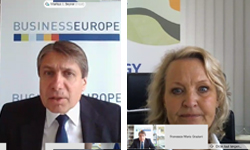BusinessEurope Headlines No. 2021-18
Discussing minimum wages and platform work with Austrian Minister for Labour

On 27 May Director General Markus J. Beyrer met the Austrian Minister for Labour Martin Kocher for an exchange on the proposed directive on minimum wages and the initiatives on platform work that are currently in preparation. Beyrer underlined the importance to fully respect Member States and Social Partners competencies as well as established social dialogue systems in the effort to achieve adequate wages across the EU. In order to address the many questions and concerns that were raised by Member States in Council and to integrate important points of the Council legal service opinion, more time will be needed to elaborate a balanced proposal. Minister Kocher and DG Beyrer also briefly discussed the upcoming initiative on platform work, which needs to address the challenges related to working conditions but must at the same time also maintain the flexibility that makes such types of work attractive for companies and workers. As in many files, attention must be on the use and enforcement of existing legislation and new guidance rather than adding additional rules.
Contact: Jasmin Ploner
Ensuring that the green and digital transitions bring real growth and employment
Watch BusinessEurope Director General Markus J. Beyrer address the Conference of Parliamentary Committees for Union Affairs of Parliaments of the European Union (COSAC), held on 31 May 2021.
Energy policy: debate with Director General at DG Energy
 On Friday 28 May Markus J. Beyrer, Director General of BusinessEurope, met with Ditte Juul Jørgensen, Director General of the Directorate-General for Energy at the European Commission to discuss some of the upcoming proposals in the framework of the Fit-for-55 package that will be presented in July. Amongst others, they discussed the revision of the Renewable Energy Directive and the Energy Efficiency Directive. Beyrer highlighted the importance to enable an adequate supply of renewable and low-carbon energy, to meet the industrial demand in its decarbonisation process. They also discussed the upcoming Hydrogen and gas decarbonisation package, also part of the Fit-for-55, with a proposal expected for the end of the year. Beyrer pointed to the importance of this package, which will regulate the entry of renewable and low-carbon gases such as hydrogen, a key development for hard-to-abate sectors to reach their climate objectives.
On Friday 28 May Markus J. Beyrer, Director General of BusinessEurope, met with Ditte Juul Jørgensen, Director General of the Directorate-General for Energy at the European Commission to discuss some of the upcoming proposals in the framework of the Fit-for-55 package that will be presented in July. Amongst others, they discussed the revision of the Renewable Energy Directive and the Energy Efficiency Directive. Beyrer highlighted the importance to enable an adequate supply of renewable and low-carbon energy, to meet the industrial demand in its decarbonisation process. They also discussed the upcoming Hydrogen and gas decarbonisation package, also part of the Fit-for-55, with a proposal expected for the end of the year. Beyrer pointed to the importance of this package, which will regulate the entry of renewable and low-carbon gases such as hydrogen, a key development for hard-to-abate sectors to reach their climate objectives.
Contact: Cecilia Serrano-Piedecasas
Exchange on the way forward for Taxonomy and Sustainable Finance
 "The renewed Sustainable Finance strategy will be an evolution, not a revolution - combining some of the EU’s existing measures, as well as some new proposals", said Peter Power, Head of Cabinet for European Commissioner McGuinness, at the latest event of BusinessEurope’s “Climate Dialogues” series on 27 May. Under the headline “Sustainable finance: How can it best help the green transition?”, participants discussed the future of the sustainable finance agenda after the publication of the April package. Kaisa-Maria Soro-Pesonen from EK, the Federation of Finnish Industries, stressed that "We do not have a problem with high ambitions, but they need to enable investments at scale and in a short time – which is currently not necessarily what we’re seeing". Adam Guibourgé-Czetwertyński, Undersecretary of State at the Ministry of Climate and Environment of Poland, pointed out that a wide range of technologies, including gas, is needed to reach climate neutrality: “If they’re not included in the taxonomy, what’s the signal we are sending to the markets?”. Helena Viñes Fiestas, Rapporteur of the Sustainable Finance Platform, and Marcel Haag, Director at DG FISMA at the European Commission, brought the perspectives of investors and policymakers to the table. Panellists agreed that the next delegated acts would be decisive, and that markets should see the taxonomy as an instrument to sketch out transition pathways, not a binary classification.
"The renewed Sustainable Finance strategy will be an evolution, not a revolution - combining some of the EU’s existing measures, as well as some new proposals", said Peter Power, Head of Cabinet for European Commissioner McGuinness, at the latest event of BusinessEurope’s “Climate Dialogues” series on 27 May. Under the headline “Sustainable finance: How can it best help the green transition?”, participants discussed the future of the sustainable finance agenda after the publication of the April package. Kaisa-Maria Soro-Pesonen from EK, the Federation of Finnish Industries, stressed that "We do not have a problem with high ambitions, but they need to enable investments at scale and in a short time – which is currently not necessarily what we’re seeing". Adam Guibourgé-Czetwertyński, Undersecretary of State at the Ministry of Climate and Environment of Poland, pointed out that a wide range of technologies, including gas, is needed to reach climate neutrality: “If they’re not included in the taxonomy, what’s the signal we are sending to the markets?”. Helena Viñes Fiestas, Rapporteur of the Sustainable Finance Platform, and Marcel Haag, Director at DG FISMA at the European Commission, brought the perspectives of investors and policymakers to the table. Panellists agreed that the next delegated acts would be decisive, and that markets should see the taxonomy as an instrument to sketch out transition pathways, not a binary classification.
Contact: Steffen Engling
Debate on the EU’s Trade Policy Review with Members of the European Parliament
 On 27 May, BusinessEurope organised a webinar with prominent members the European Parliament’s Committee on International Trade – MEPs Hübner (EPP group), Rodríguez-Piñero (S&D group), Andrews (Renew Europe group) and Cavazzini (Verts/ALE group). Taking place in the framework of our International Relations Committee, the focus of the discussion was assessing the European Commission’s Communication on the review of the EU’s trade policy and identifying key areas of action. The MEPs welcomed the concept of “open strategic autonomy” as a basis for the EU’s trade policy, underlying that, in the process of working towards the EU’s resilience and autonomy, it should not take protectionist interpretations. Underlying the challenges that we currently face in global trade, which are often exacerbated by the COVID-19 pandemic, a clear priority for the MEPs is the reform of the World Trade Organisation (WTO). The EU has a leadership role to play in this process, promoting a rules-based trade together with its partners. Cooperation with the U.S. is essential, especially on issues such as the reform of the WTO, the digital and green transformations, and addressing challenges posed by China’s behavior. During the discussion, particular attention was paid to the upcoming legislation on mandatory supply chain due diligence and the need to ensure proportionality and help businesses comply with the regulatory obligations.
On 27 May, BusinessEurope organised a webinar with prominent members the European Parliament’s Committee on International Trade – MEPs Hübner (EPP group), Rodríguez-Piñero (S&D group), Andrews (Renew Europe group) and Cavazzini (Verts/ALE group). Taking place in the framework of our International Relations Committee, the focus of the discussion was assessing the European Commission’s Communication on the review of the EU’s trade policy and identifying key areas of action. The MEPs welcomed the concept of “open strategic autonomy” as a basis for the EU’s trade policy, underlying that, in the process of working towards the EU’s resilience and autonomy, it should not take protectionist interpretations. Underlying the challenges that we currently face in global trade, which are often exacerbated by the COVID-19 pandemic, a clear priority for the MEPs is the reform of the World Trade Organisation (WTO). The EU has a leadership role to play in this process, promoting a rules-based trade together with its partners. Cooperation with the U.S. is essential, especially on issues such as the reform of the WTO, the digital and green transformations, and addressing challenges posed by China’s behavior. During the discussion, particular attention was paid to the upcoming legislation on mandatory supply chain due diligence and the need to ensure proportionality and help businesses comply with the regulatory obligations.
Contact: Sofia Bournou
An open trade policy: part and parcel of a resilient EU
 On 2 June, Luisa Santos, Deputy Director General of BusinessEurope, participated in a seminar organised by the European Parliament’s Art.17 of the TFEU (Treaty on the Functioning of the EU) coordinator on dialogue with churches, religious associations or communities, philosophical and non-confessional organisations. The discussion offered rare and interesting perspectives on the EU’s Trade Policy Review. Discussing about the balance between openness and autonomy, Santos argued: “Trade is an engine for growth in the EU, creating jobs and boosting innovation and technological leadership in an increasingly competitive world. To achieve these, the EU depends on imports of raw materials, goods and services. Therefore, it needs an open and rules-based trade policy that will ensure access to markets and level the playing field for EU companies”. A resilient EU also means a more sustainable EU and it is important to ensure that all policies – trade, environmental, digital, are mutually reinforcing and promote global cooperation. “The discussion on sustainable value chains and due diligence obligations is very timely. However, upcoming EU legislation should be workable for business and not transfer State’s obligations onto them. This is a balance that should be maintained”, concluded Santos.
On 2 June, Luisa Santos, Deputy Director General of BusinessEurope, participated in a seminar organised by the European Parliament’s Art.17 of the TFEU (Treaty on the Functioning of the EU) coordinator on dialogue with churches, religious associations or communities, philosophical and non-confessional organisations. The discussion offered rare and interesting perspectives on the EU’s Trade Policy Review. Discussing about the balance between openness and autonomy, Santos argued: “Trade is an engine for growth in the EU, creating jobs and boosting innovation and technological leadership in an increasingly competitive world. To achieve these, the EU depends on imports of raw materials, goods and services. Therefore, it needs an open and rules-based trade policy that will ensure access to markets and level the playing field for EU companies”. A resilient EU also means a more sustainable EU and it is important to ensure that all policies – trade, environmental, digital, are mutually reinforcing and promote global cooperation. “The discussion on sustainable value chains and due diligence obligations is very timely. However, upcoming EU legislation should be workable for business and not transfer State’s obligations onto them. This is a balance that should be maintained”, concluded Santos.
Contact: Sofia Bournou
Partnering up with Mercosur on sustainability
 On 31 May, Deputy Director Eleonora Catella participated in a meeting of the European Free Trade Association (EFTA) Consultative Committee on the negotiated EU and EFTA-Mercosur free trade agreements and the views of social partners on the agreements, with a focus on sustainability. “The fight against climate change is a global challenge and the EU needs to partner up with as many countries as possible. Business is committed to the technological transformation, it’s not a question of “whether” but rather “how and when”. We need a high degree of innovation and fast. Companies are investing in new technologies, but standardisation and scalability are crucial factors to help reduce high risks, costs and uncertainty, especially for small players”, she said. Efforts on corporate sustainability are mainly led by companies that have invested on the ground, while the EU-Mercosur agreement can multiply these good examples and allow other companies, especially SMEs, to be more engaged on the ground with Mercosur counterparts.
On 31 May, Deputy Director Eleonora Catella participated in a meeting of the European Free Trade Association (EFTA) Consultative Committee on the negotiated EU and EFTA-Mercosur free trade agreements and the views of social partners on the agreements, with a focus on sustainability. “The fight against climate change is a global challenge and the EU needs to partner up with as many countries as possible. Business is committed to the technological transformation, it’s not a question of “whether” but rather “how and when”. We need a high degree of innovation and fast. Companies are investing in new technologies, but standardisation and scalability are crucial factors to help reduce high risks, costs and uncertainty, especially for small players”, she said. Efforts on corporate sustainability are mainly led by companies that have invested on the ground, while the EU-Mercosur agreement can multiply these good examples and allow other companies, especially SMEs, to be more engaged on the ground with Mercosur counterparts.
Contact: Eleonora Catella
Taxonomy still needs to improve
 European companies are committed to the Green Deal’s objectives and believe the Taxonomy should not only be a good instrument on paper but also be capable of supporting their transition efforts. To turn the ambitions into reality, BusinessEurope published two position papers on 2 June: the first clarifies the reading and expectations of the business community on the April Taxonomy Package; the second spells out businesses’ questions and concerns on draft rules for the Taxonomy reporting. These two papers want to contribute to the ongoing reflections on the Taxonomy Regulation: with €350 billion of investments to reach 2030 targets, companies need this instrument to function. BusinessEurope papers share a number of observations of the business community on the future implementation and developments of the Taxonomy. Taxonomy’s reporting is likely to involve thousands of detailed technical and accounting judgements. Companies therefore need clarity, proportionate rules and time.
European companies are committed to the Green Deal’s objectives and believe the Taxonomy should not only be a good instrument on paper but also be capable of supporting their transition efforts. To turn the ambitions into reality, BusinessEurope published two position papers on 2 June: the first clarifies the reading and expectations of the business community on the April Taxonomy Package; the second spells out businesses’ questions and concerns on draft rules for the Taxonomy reporting. These two papers want to contribute to the ongoing reflections on the Taxonomy Regulation: with €350 billion of investments to reach 2030 targets, companies need this instrument to function. BusinessEurope papers share a number of observations of the business community on the future implementation and developments of the Taxonomy. Taxonomy’s reporting is likely to involve thousands of detailed technical and accounting judgements. Companies therefore need clarity, proportionate rules and time.
![]()
![]() Contact: Carolina Vigo
Contact: Carolina Vigo
Calendar 
- 11 June: Launch of BusinessEurope's 2021 Reform Barometer
- 11-13 June: G7 summit 2021 - "Build back better"
- 22 June: ECCA 2021 – 5th European climate change adaptation conference
Not yet a subscriber? Register here.
Reminder: please have a look at our privacy policy